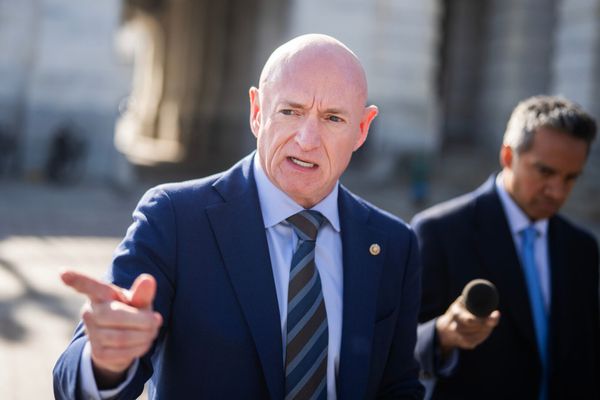
A salvo of machine gun fire, customary during funerals, illuminated the night sky as dozens of men converged in a dimly lit, unpaved alley on the edges of the sprawling slums of Sadr city to pay their respects. A giant picture of Ali Hassan al-Daraaji had been erected outside the family home in north-east Baghdad to announce his “martyrdom” in this week’s US airstrikes on Iraqi armed groups.
The series of strikes left nine fighters dead, including Daraaji, the first Iraqi fatalities linked to the Israel-Hamas war. Even as a tenuous truce takes hold in Gaza, the pace and intensity of clashes in Iraq has picked up, highlighting the risk of spillover in a country that has long been mired in conflict.
On Tuesday and Wednesday, the US targeted fighters it believed were responsible for dozens of attacks carried out on American troops in Iraq and Syria. The operations have been claimed under the banner of the so-called Islamic Resistance in Iraq in response to “the crimes committed by the enemy against our people in Gaza”, according statements released on its Telegram channel.

The Pentagon said it acted in defence of its troops, who returned to Iraq in 2014 to help the Iraqi government fight Islamic State. But the Daraaji family, whose history is steeped in fighting the 2003-11 US occupation of Iraq, sees the latest events as a continuation of a long history of unjust American policies in the Middle East, and as a sign that two decades after its invasion, the US is still treading on Iraqi sovereignty.
Reticent and defiant, many of the men at the funeral were members of Kataib Hezbollah, the secretive group believed responsible for the bulk of the latest attacks. Some had joined when it first formed during the early days of the occupation. Others, like Ali and his uncle Dholfaqar al-Daraaji, followed suit in 2014, when Kataib Hezbollah ostensibly merged into the state security apparatus under the Popular Mobilisation Forces (PMF), an umbrella of Shia paramilitaries that received Iranian support to fight IS.
Anti-American sentiment runs deep in this community, which has reeled from loss after loss. “The people don’t want the Americans. They are the ones responsible for the destruction of Iraq,” Dholfaqar said. Ali, aged 32 at the time of his death, was the seventh family member killed in the intermittent spasms of violence that have gripped Iraq since 2003. Ali’s mother, two siblings and an uncle died in the sectarian bloodletting that followed the invasion, while two young cousins lost their lives when a mortar hit the family home in 2008.
Images of dead Palestinian children being pulled from under the rubble have brought those painful memories back to the surface and revived anger at the US, seen as a party to the conflict because of the diplomatic cover and military aid it provides to Israel. “America is responsible for the killing of children in Gaza,” Dholfaqar said. “All Iraqis stand with Gaza, not just the resistance factions, not just the PMF. Every time there is a war, we unite.”
Iraq has a long history of supporting the Palestinian struggle for statehood, an issue that is deeply ingrained in Arab identity for Sunnis and Shias. When Israel launched its ground offensive on 26 October, prayers in support of Gaza rang out from minarets across the Iraqi capital. Sunni mosques across the city united to organise joint prayers in support of Palestinians, with some Sunnis even expressing cautious support for the attacks on Americans carried out by otherwise unpopular Shia armed groups.
“If they hit the Americans, may God help them. We pray for their good luck,” said Munir Al Obaidi, the vice-president of the Council of Scholars, a religious organisation that includes over a thousand Sunni clerics in Iraq.
The latest flare-up poses a headache for the Iraqi government and has once again exposed the authorities’ limits in restraining armed groups. The prime minister, Mohammed Shia al-Sudani, was brought to power last year by a ruling alliance that included political allies of “resistance factions” such as Kataib Hezbollah, who agreed to temporarily lay down arms to give Sudani a chance to renegotiate the US-Iraq relationship and agree on a timeframe for the departure of US troops.
But patience inside the ruling alliance is wearing thin. “There is pressure on the government to accelerate the withdrawal of American forces,” said an adviser to Sudani, who asked for anonymity to speak freely. While most members of the ruling alliance support Sudani’s efforts to advocate for a political solution to the Israel-Hamas war that would also calm the situation in Iraq, some think that negotiations are “not sufficient to deter Israeli aggression”, the official said.
The government has tried to quell the fallout by deploying security forces to stop Kataib Hezbollah from launching fresh operations. But as the mourners began to disperse on Thursday evening, phones buzzed with news of yet another attack on US troops in western Iraq.
A Kataib Hezbollah statement issued on Saturday announced a reduction in the pace of attacks until the end of the Gaza truce, but vowed that they would continue until Iraq was “liberated” from the “occupation forces”, no matter the sacrifice.
“For every martyr, a thousand more will take his place,” said Dholfaqar al-Daraaji.







